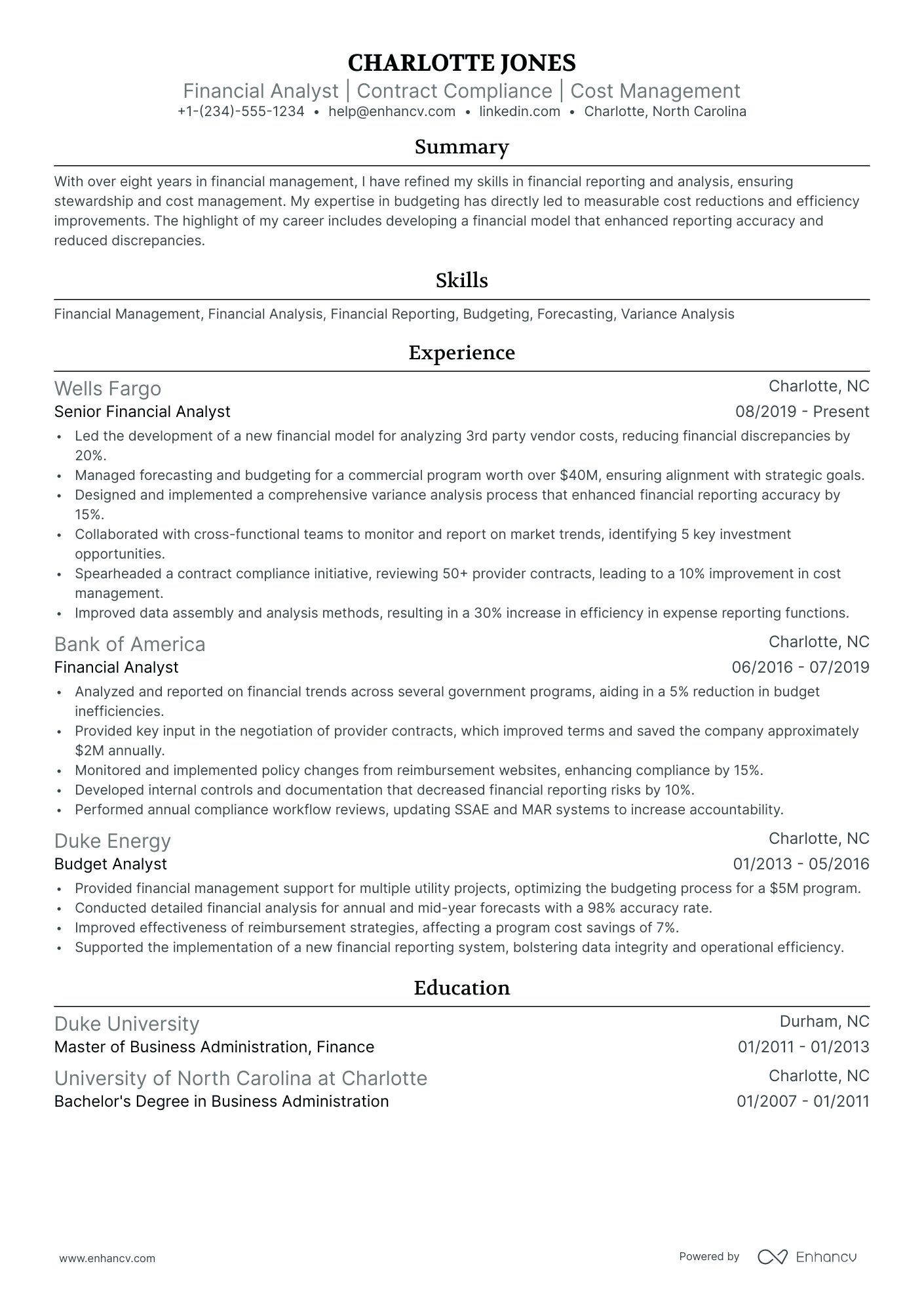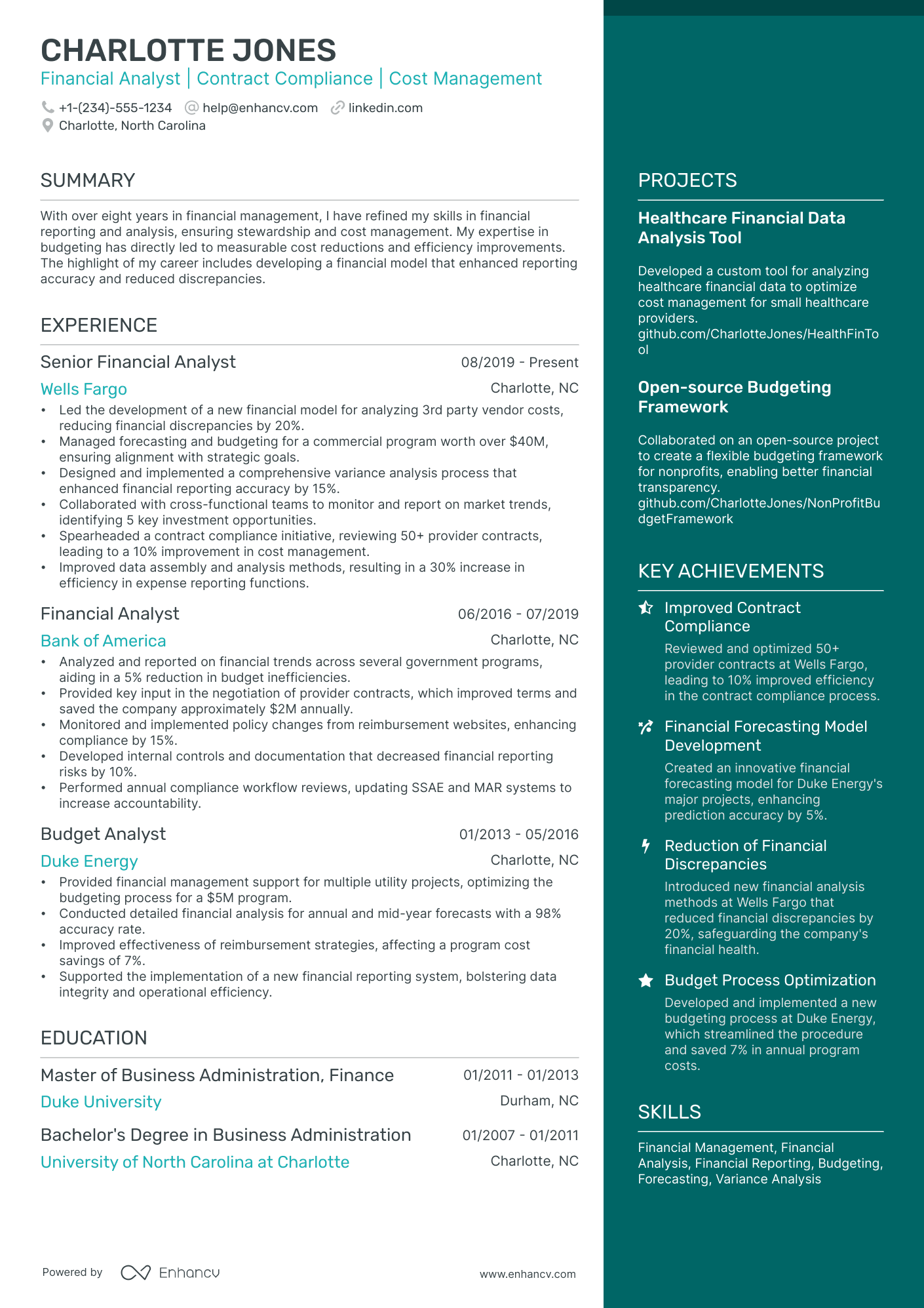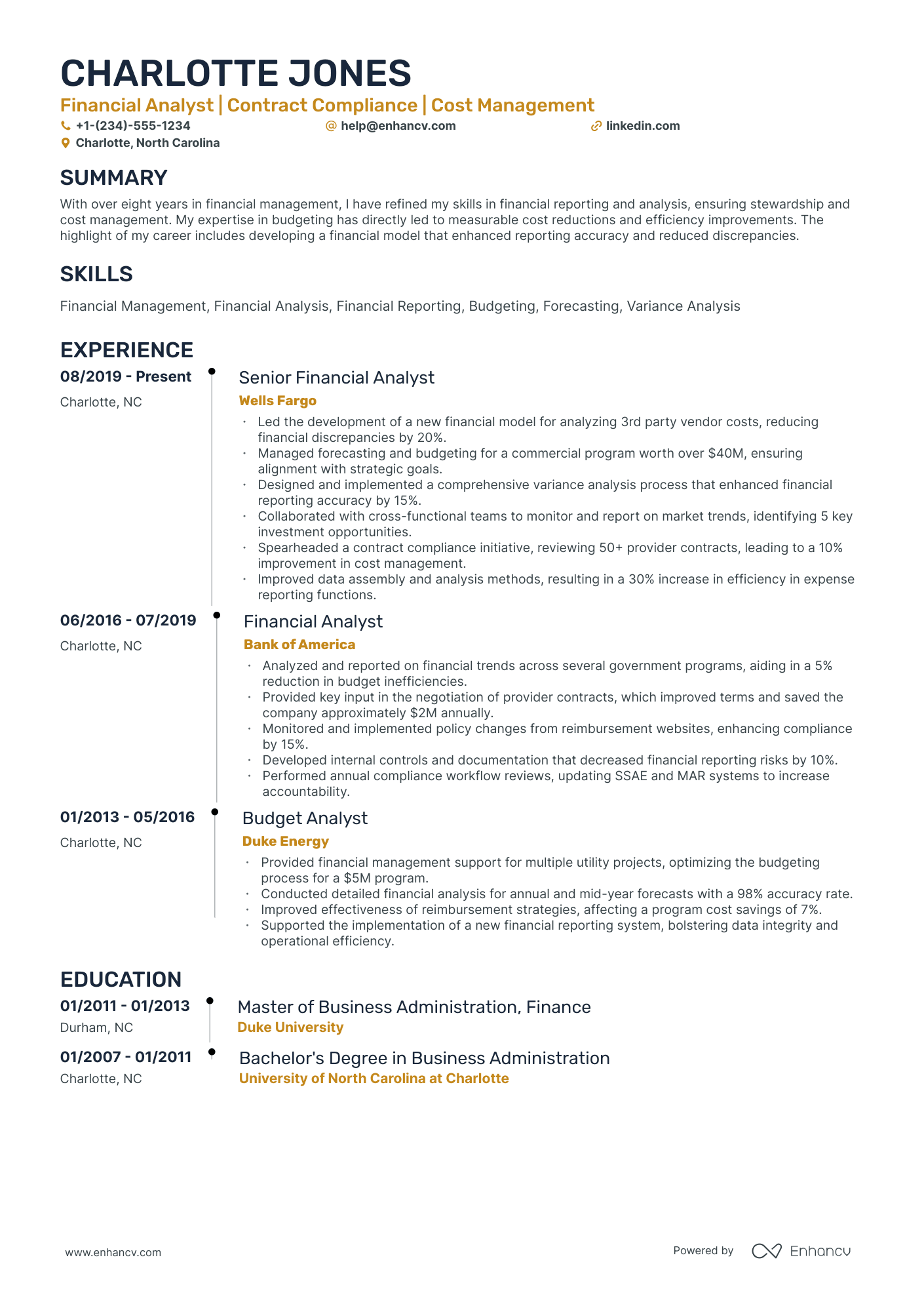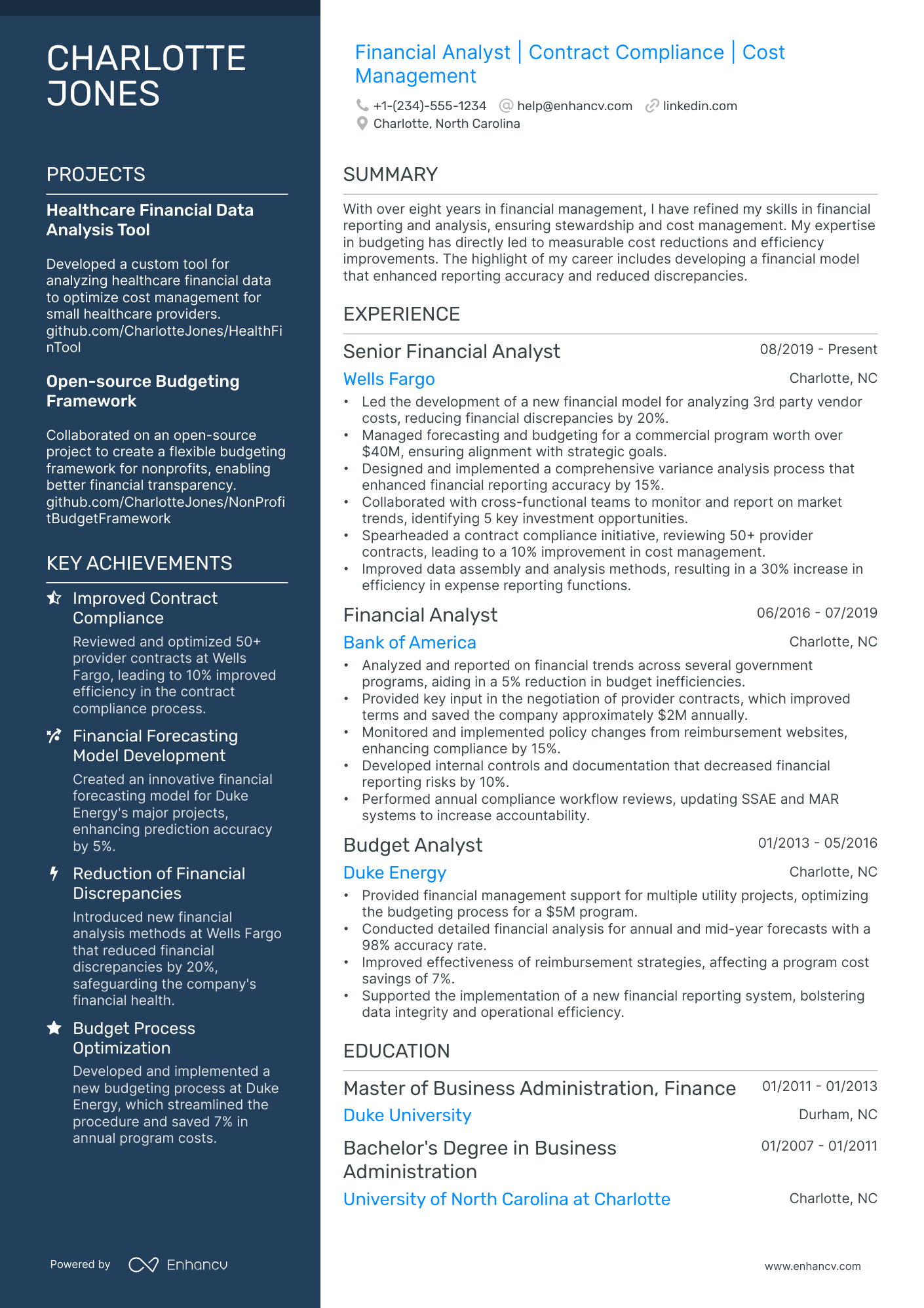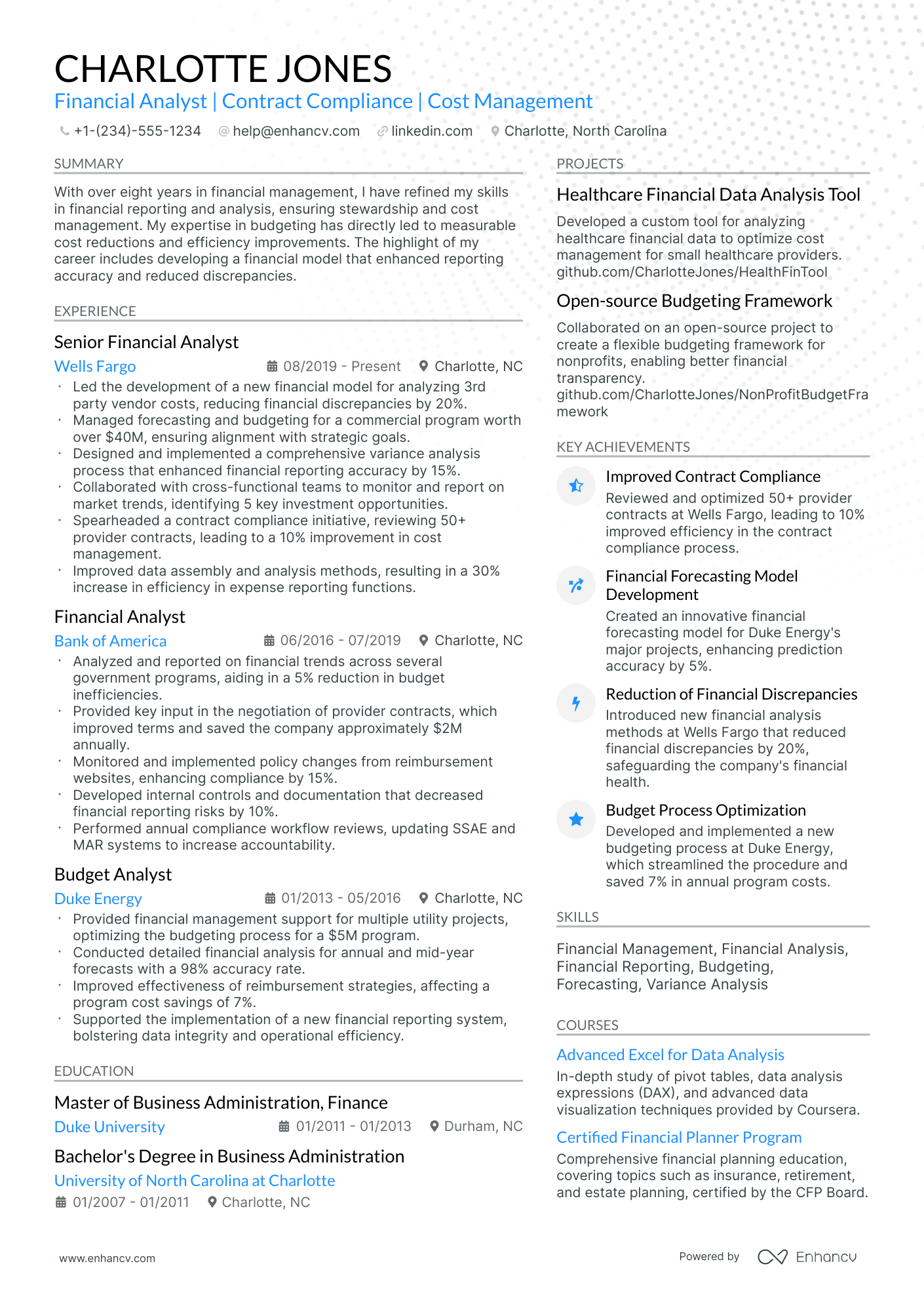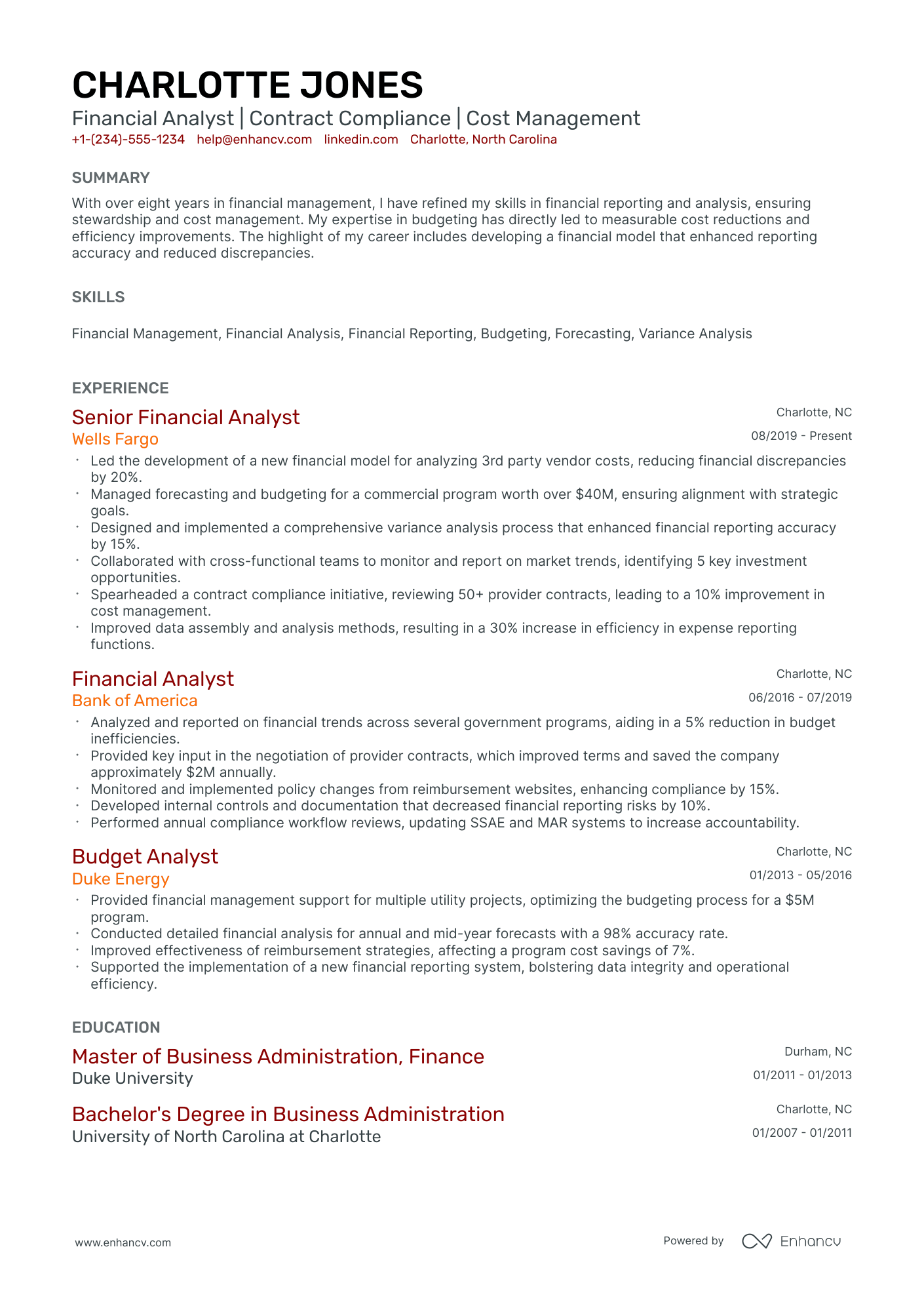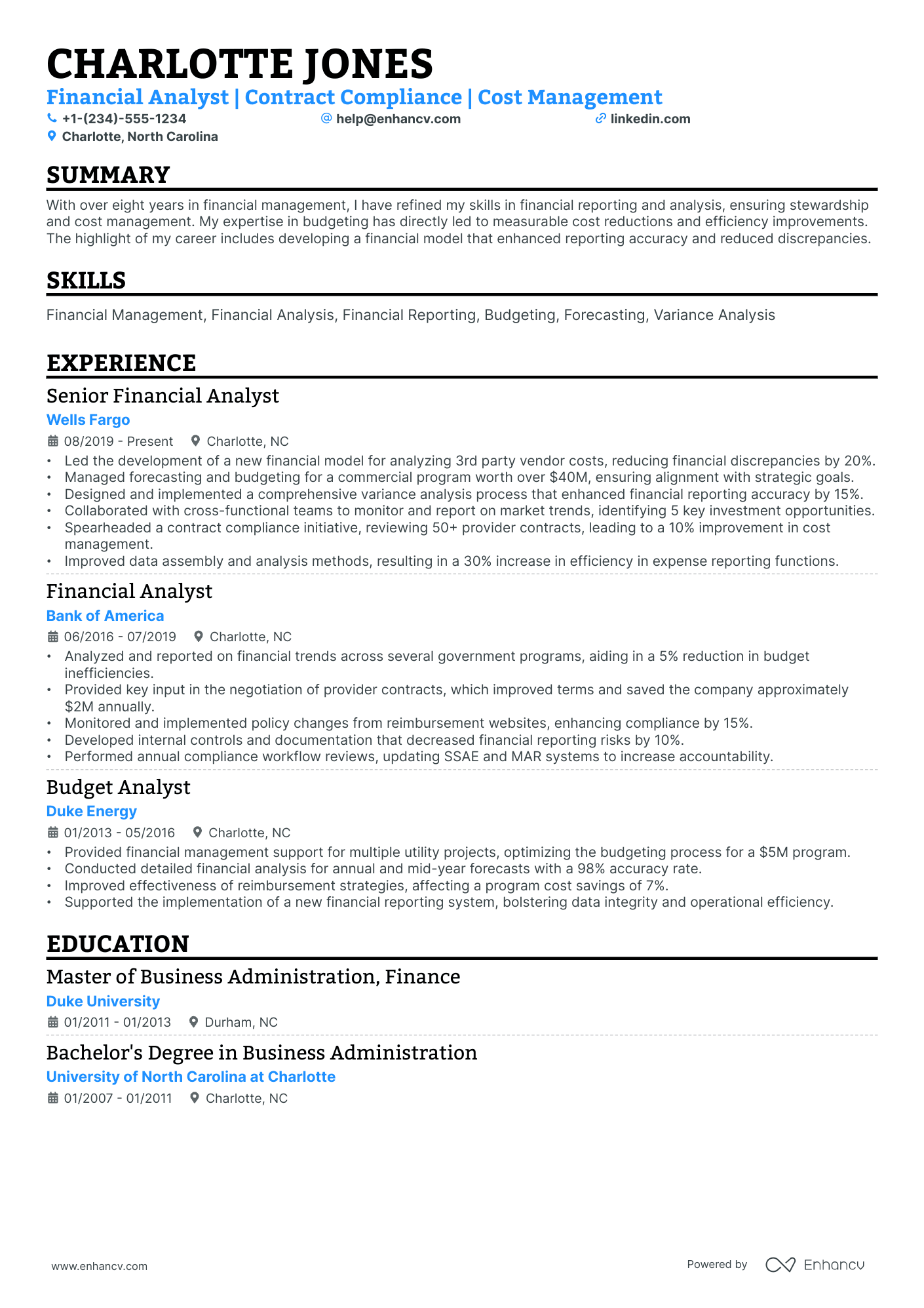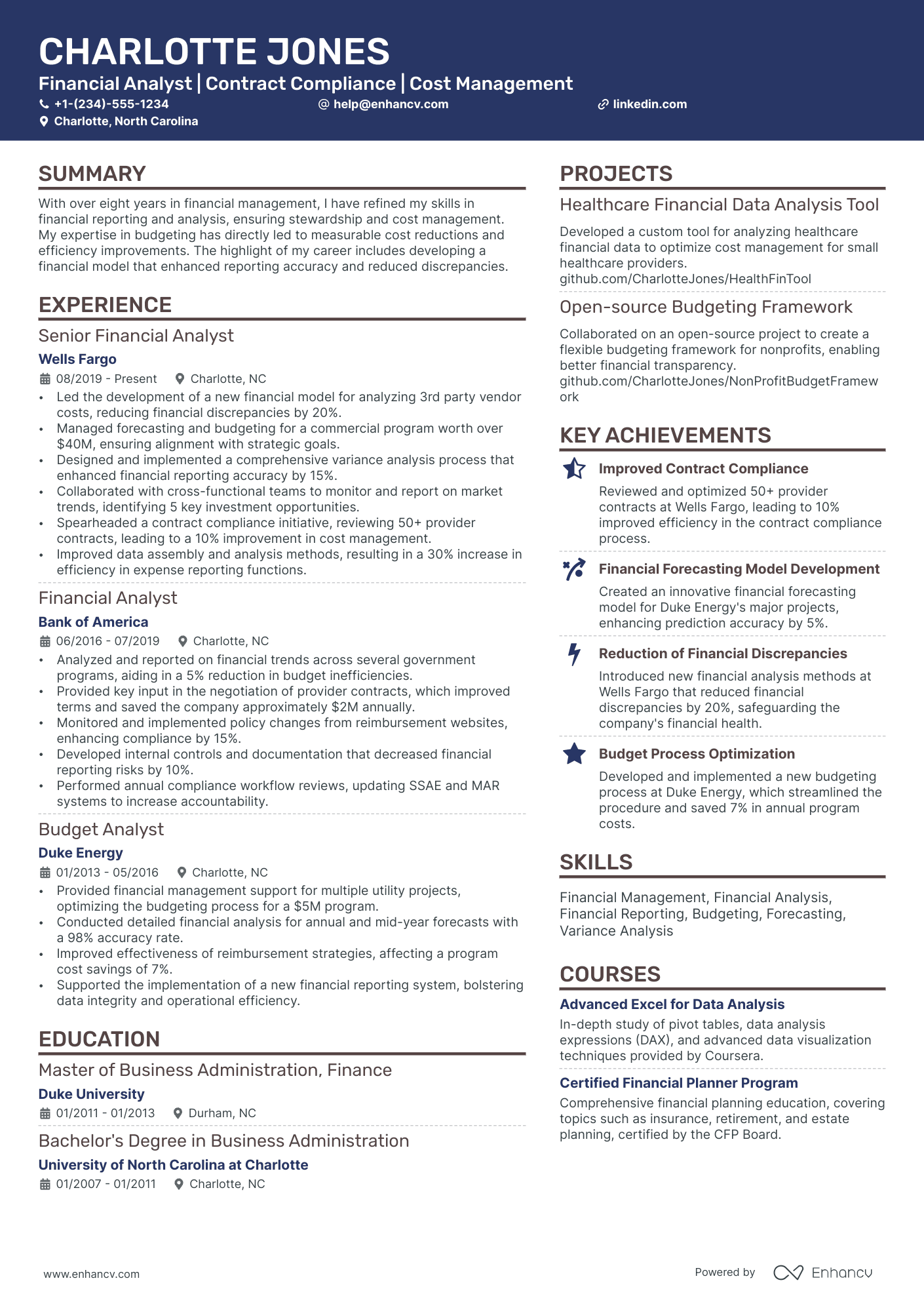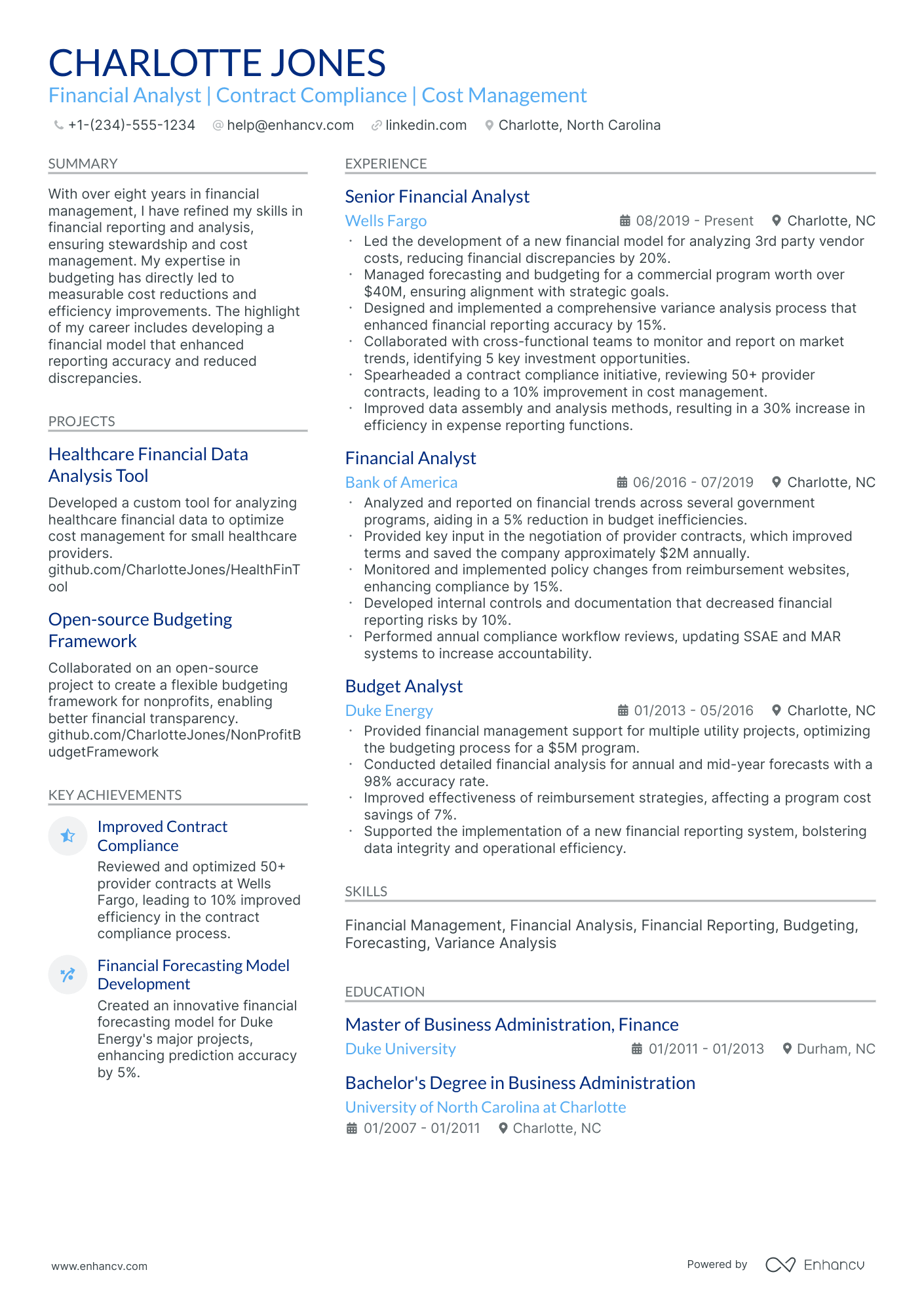As a healthcare data analyst, you might struggle to effectively showcase the broad scope of your data management skills within the limited space of a resume. Our guide provides you with proven strategies to concisely present your expertise and accomplishments, ensuring your resume stands out to potential employers in the healthcare industry.
- Sample industry-leading professional resumes for inspiration and healthcare data analyst resume-writing know-how.
- Focus recruiters' attention on what matters most - your unique experience, achievements, and skills.
- Write various resume sections to ensure you meet at least 95% of all job requirements.
- Balance your healthcare data analyst technical expertise with personality to stand out amongst candidates.
If the healthcare data analyst resume isn't the right one for you, take a look at other related guides we have:
Enhancing your healthcare data analyst resume: format and layout tips
"Less is more" - this principle is key for your healthcare data analyst resume design. It emphasizes the importance of focusing on why you're the ideal candidate. Simultaneously, it's crucial to select a resume design that is both clear and simple, ensuring your qualifications are easily readable.
Four popular formatting rules (and an additional tip) are here to optimize your healthcare data analyst resume:
- Listing experience in reverse chronological order - start with your most recent job experiences. This layout helps recruiters see your career progression and emphasizes your most relevant roles.
- Including contact details in the header - make sure your contact information is easily accessible at the top of your resume. In the header, you might also include a professional photo.
- Aligning your expertise with the job requirements - this involves adding essential sections such as experience, skills, and education that match the job you're applying for.
- Curating your expertise on a single page - if your experience spans over a decade, a two-page resume is also acceptable.
Bonus tip: Ensure your healthcare data analyst resume is in PDF format when submitting. This format maintains the integrity of images, icons, and layout, making your resume easier to share.
Finally, concerning your resume format and the Applicant Tracker System (ATS):
- Use simple yet modern fonts like Rubik, Lato, Montserrat, etc.
- All serif and sans-serif fonts are friendly to ATS systems. Avoid script fonts that look like handwriting, however.
- Fonts such as Ariel and Times New Roman are suitable, though commonly used.
- Both single and double-column resumes can perform well with the ATS.
Think about the market’s preferences – a Canadian resume, for instance, could have a different layout.
Upload & Check Your Resume
Drop your resume here or choose a file. PDF & DOCX only. Max 2MB file size.
PRO TIP
If you're in the process of obtaining your certificate or degree, list the expected date you're supposed to graduate or be certified.
The five (plus) definite sections your resume for a healthcare data analyst job should include are:
- Header with your headline, contact details, and/or a preview of your work
- Summary (or objective) to pinpoint how your success aligns with the role
- Experience with bullets of your most relevant achievements in the field
- Skills to integrate vital job requirements (both technical and personal)
- Your further dedication to the field, showcased via relevant higher education and/or certifications
What recruiters want to see on your resume:
- Proficiency with healthcare data software tools and platforms (e.g., Electronic Health Records (EHR), SQL, Tableau).
- Understanding of healthcare industry standards, including HIPAA regulations and data privacy practices.
- Experience with statistical analysis and data visualization specific to healthcare outcomes, cost analysis, and patient data metrics.
- Knowledge of medical terminologies, clinical data, and healthcare systems.
- Strong analytical abilities with a proven track record of data-driven decision support and reporting in a healthcare setting.
Guide to your most impressive healthcare data analyst resume experience section
When it comes to your resume experience , stick to these simple, yet effective five steps:
- Show how your experience is relevant by including your responsibility, skill used, and outcome/-s;
- Use individual bullets to answer how your experience aligns with the job requirements;
- Think of a way to demonstrate the tangible results of your success with stats, numbers, and/or percentages ;
- Always tailor the experience section to the healthcare data analyst role you're applying for - this may sometimes include taking out irrelevant experience items;
- Highlight your best (and most relevant) achievements towards the top of each experience bullet.
You're not alone if you're struggling with curating your experience section. That's why we've prepared some professional, real-life healthcare data analyst resume samples to show how to best write your experience section (and more).
- Managed and analyzed patient data from over 150,000 records, improving data accuracy by 95% and supporting clinical decision-making.
- Developed predictive models for patient readmission risks, leading to a 10% reduction in readmissions and estimated annual cost savings of $500,000.
- Collaborated with healthcare providers to design and implement custom reports, enhancing operational efficiency and reducing report generation time by 30%.
- Automated data extraction processes for patient demographics, reducing time spent on manual data entry by 40 hours per week.
- Conducted extensive analysis on medication adherence data, influencing the development of a targeted patient outreach program.
- Spearheaded a data quality initiative that corrected over 5,000 records, significantly improving the reliability of the hospital’s data warehouse.
- Analyzed clinical trial data to assist in the research and development of new pharmaceuticals, shortening the trial period by 2 months.
- Performed cost-benefit analysis on new healthcare services, underpinning the launch of a profitable telehealth service line.
- Created a dashboard for tracking healthcare outcomes which was adopted across multiple departments, promoting data-driven decision-making.
- Collaborated with IT to implement an Electronic Health Records (EHR) system, enhancing data accessibility for 200+ healthcare professionals.
- Analyzed patient visit patterns to optimize scheduling and reduce wait times by 15%, significantly improving patient satisfaction.
- Led a cross-functional team to cleanse and migrate historical patient data into a new analytics platform.
- Evaluated and improved the coding and categorization of healthcare diagnoses, resulting in a 20% increase in billing efficiency.
- Employed statistical analysis to evaluate healthcare provider performance, contributing to a strategic plan for provider education and development.
- Assisted in the creation and release of an internal metric tracking tool used to monitor key health performance indicators.
- Developed and monitored performance metrics for healthcare quality initiatives, contributing to a 25% improvement in patient care coordination.
- Provided analytic support for population health management programs, aiding in the identification of at-risk populations.
- Implemented a new report distribution system, increasing the availability of actionable insights for healthcare managers and executives.
- Integrated machine learning algorithms to analyze large datasets, streamlining operational processes and improving patient care delivery.
- Contributed to a multi-year project aimed at reducing hospital-acquired infections, which saw a 40% decrease in infection rates.
- Mentored a team of junior analysts, enhancing overall team performance and data reporting accuracy.
- Oversaw the migration of healthcare data to cloud-based storage, ensuring higher data security and 24/7 data availability for remote teams.
- Conducted in-depth analysis on emergency department utilization, providing insights that led to a 15% reduction in unnecessary visits.
- Facilitated the integration of business intelligence tools with existing healthcare information systems, allowing for real-time data analysis.
- Created a comprehensive reporting system for tracking the effectiveness of new patient care models, which became the standard in 5 hospitals.
- Analyzed data from patient surveys to improve service delivery, achieving a 20% increase in patient satisfaction scores.
- Participated in the development of an analytics-driven approach to staffing, optimizing resources and reducing overtime costs by 18%.
- Leveraged advanced analytics to identify fraud, waste, and abuse in billing practices, saving the company an estimated $1 million annually.
- Collaborated with clinical teams to understand and map patient journeys, resulting in a more personalized approach to patient care planning.
- Implemented a self-service analytics portal for non-technical staff, empowering them with data insights and reducing reliance on the analytics team by 20%.
The following content includes information from "O*NET OnLine" by the U.S. Department of Labor, Employment and Training Administration (USDOL/ETA). Used under the CC BY 4.0 license. The data represents the top responsibilities present on the task lists for healthcare data analyst professionals.
Top Responsibilities for Healthcare Data Analyst:
- Assign the patient to diagnosis-related groups (DRGs), using appropriate computer software.
- Compile medical care and census data for statistical reports on diseases treated, surgery performed, or use of hospital beds.
- Design databases to support healthcare applications, ensuring security, performance and reliability.
- Develop in-service educational materials.
- Evaluate and recommend upgrades or improvements to existing computerized healthcare systems.
- Facilitate and promote activities, such as lunches, seminars, or tours, to foster healthcare information privacy or security awareness within the organization.
- Identify, compile, abstract, and code patient data, using standard classification systems.
- Manage the department or supervise clerical workers, directing or controlling activities of personnel in the medical records department.
- Monitor changes in legislation and accreditation standards that affect information security or privacy in the computerized healthcare system.
- Plan, develop, maintain, or operate a variety of health record indexes or storage and retrieval systems to collect, classify, store, or analyze information.
Quantifying impact on your resume
- Highlight your proficiency in data analysis tools by mentioning the number of tools you are adept with and how they have improved data processing times.
- Specify the exact percentage by which your analytical findings have increased healthcare operational efficiency in your past roles.
- Detail the number of data mining projects you have led or contributed to and the corresponding outcomes to your healthcare institution.
- Include the size of data sets you've worked with to showcase your capability to handle large-scale healthcare data analysis.
- Mention any reductions in costs or resource utilization that were a direct result of your data analytics insights, using exact figures.
- Quantify the number of reports or dashboards you've created and how this has aided in decision-making processes for healthcare managers or clinicians.
- Document the number of cross-departmental collaborations you've taken part in with a focus on the impact these have had on patient care or service delivery.
- Cite specific instances in which your data-driven recommendations have led to the implementation of new healthcare policies or procedures.
Action verbs for your healthcare data analyst resume
What if you don't have any experience?
There are two very common scenarios about candidates with less experience. They are either:
- Fresh out of college in search of a healthcare data analyst role
- Transferring over from a completely different field
Both of these types of candidates still have a shot at landing their first job in the industry.
All they need to do about the experience section of their healthcare data analyst resume is:
- Consider their strengths - would the outcomes of their previous roles or niche skill sets impress recruiters? Feature those towards the top of your resume
- Exclude any and all irrelevant experience items - remember that at the end of the day, you're telling a story that aims to align with the ideal candidate for the healthcare data analyst job
- Win recruiters over with personality - perhaps your ambition, dreams, and diligence would make you the perfect fit for the healthcare data analyst role. Dedicate resume space to detail your personality traits by showcasing how they've helped you succeed in past roles
- Tailor your experience to specific job requirements - ensure your healthcare data analyst resume answers the advert in the best way possible.
Recommended reads:
PRO TIP
Mention specific courses or projects that are pertinent to the job you're applying for.
How to showcase hard skills and soft skills on your resume
Reading between the lines of your dream job, you find recruiters are looking for candidates who have specific software or hardware knowledge, and personal skills.
Any technology you're adept at shows your hard skills. This particular skill set answers initial job requirements, hinting at how much time your potential employers would have to invest in training you. Showcase you have the relevant technical background in your communicate, solve problems, and adapt to new environments. Basically, your interpersonal communication skills that show recruiters if you'd fit into the team and company culture. You could use the achievements section to tie in your greatest wins with relevant soft skills.
It's also a good idea to add some of your hard and soft skills across different resume sections (e.g. summary/objective, experience, etc.) to match the job requirements and pass the initial screening process. Remember to always check your skill spelling and ensure that you've copy-pasted the name of the desired skills from the job advert as is.
Top skills for your healthcare data analyst resume:
SQL
Python
R
Excel
Tableau
Power BI
SAS
Healthcare Data Standards (e.g., HL7, ICD-10)
Data Warehousing
Data Visualization
Analytical Thinking
Attention to Detail
Communication
Problem-Solving
Team Collaboration
Time Management
Critical Thinking
Adaptability
Project Management
Interpersonal Skills
Next, you will find information on the top technologies for healthcare data analyst professonals from "O*NET OnLine" by the U.S. Department of Labor, Employment and Training Administration (USDOL/ETA). Used under the CC BY 4.0 license.
Top technologies for Healthcare Data Analyst’s resume:
- eClinicalWorks EHR software
- Henry Schein Dentrix
- Eko
- Microsoft SQL Server
- Structured query language SQL
PRO TIP
If you're in the process of obtaining your certificate or degree, list the expected date you're supposed to graduate or be certified.
Discover the perfect certification and education to list on your healthcare data analyst resume
Value the insights your resume education section offers. It can shed light on various proficiencies and experiences tailored for the job.
- Add only college or university degrees, stating the institution and duration.
- If you're nearing the end of your degree, note your graduation date.
- Weigh the pros and cons of including unrelated degrees - it might not be your best choice with so little space on your resume.
- Talk about your educational achievements if they amplify your relevant experience.
There are so many certificates you can list on your resume.
Just which ones should make the cut?
- List your prominent higher education degree in a separate box, alongside the name of the institute you've obtained it from and your graduation dates
- Curate only relevant certificates that support your expertise, hard skills, and soft skills
- Certificates that are more niche (and rare) within the industry could be listed closer to the top. Also, this space could be dedicated to more recent certifications you've attained
- Add a description to your certificates or education, only if you deem this could further enhance your chances of showcasing your unique skill set
When listing your certificates, remember that it isn't a case of "the more, the merrier", but rather "the more applicable they are to the industry, the better".
Recruiters have hinted that these are some of the most in-demand certificates for healthcare data analyst roles across the industry:
The top 5 certifications for your healthcare data analyst resume:
- Certified Health Data Analyst (CHDA) - American Health Information Management Association (AHIMA)
- Certified Analytics Professional (CAP) - INFORMS
- Healthcare data analyst Certificate - American Society of Health Informatics Managers (ASHIM)
- Certified Professional in Healthcare Information and Management Systems (CPHIMS) - Healthcare Information and Management Systems Society (HIMSS)
- IBM Certified Data Analyst - IBM Professional Certification Program
The content below includes information from "O*NET OnLine" by the U.S. Department of Labor, Employment and Training Administration (USDOL/ETA). Used under the CC BY 4.0 license. The data represents the top associations for healthcare data analyst professionals.
Top US associations for a Healthcare Data Analyst professional
- AAPC
- American Association of Healthcare Administrative Management
- American Health Information Management Association
- American Medical Informatics Association
- American Nursing Informatics Association
PRO TIP
Mention specific courses or projects that are pertinent to the job you're applying for.
Recommended reads:
Should you write a resume summary or an objective?
No need to research social media or ask ChatGPT to find out if the summary or objective is right for your healthcare data analyst resume.
- Experienced candidates always tend to go for resume summaries. The summary is a three to five sentence long paragraph that narrates your career highlights and aligns your experience to the role. In it you can add your top skills and career achievements that are most impressive.
- Junior professionals or those making a career change, should write a resume objective. These shouldn't be longer than five sentences and should detail your career goals . Basically, how you see yourself growing in the current position and how would your experience or skill set could help out your potential employers.
Think of both the resume summary and objective as your opportunity to put your best foot forward - from the get go - answering job requirements with skills.
Use the below real-world healthcare data analyst professional statements as inspiration for writing your resume summary or objective.
Resume summaries for a healthcare data analyst job
- Dedicated healthcare data analyst with over 5 years of experience, specializing in the implementation of EMR systems and statistical analysis of patient outcomes. Skilled in SQL, Python, and R with a track record of reducing operational costs by 20% through data-driven decision-making. Seeking to leverage expertise in analytics to optimize healthcare delivery at a regional medical center.
- Former financial analyst with a solid decade of experience transitioning to healthcare analytics, motivated by the potential for data to improve patient care. Proficient in database management, predictive modeling, and advanced Excel. Successfully led a team to automate revenue forecasting, producing a 15% decrease in budgetary errors.
- Enthusiastic new graduate eager to apply comprehensive knowledge of public health, data science, and statistical analysis to a career in healthcare data analytics. With a recent master's degree in Public Health and a certification in Big Data Analysis, eager to contribute to data-driven strategies that enhance patient outcomes and reduce inefficiencies.
- Accomplished IT professional with over 8 years of experience in software development pivoting to healthcare data analytics out of a commitment to contribute to meaningful change in patient care quality. Brings expertise in data mining, processing, and visualization, as well as a proven ability to lead cross-functional teams to streamline operations.
- Passionate about harnessing the transformative power of data in healthcare, a mathematically skilled professional with a recent certification in Data Analytics from an esteemed university. Specialize in predictive analysis, adept in Python and R, and committed to extracting actionable insights from complex datasets that can revolutionize healthcare delivery practices.
- Aspiring healthcare data analyst possessing strong analytical skills and a Bachelor's degree in Health Information Management. With a foundational understanding of machine learning, big data technologies, and healthcare informatics, prepared to take on complex data challenges to identify trends and insights that help improve clinical decision-making and operational efficiency.
Optimize your resume summary and objective for ATS
Drop your resume here or choose a file.
PDF & DOCX only. Max 2MB file size.
Average salary info by state in the US for healthcare data analyst professionals
Local salary info for Healthcare Data Analyst.” Source: My Next Move, National Center for O*NET Development. Accessed 10/15/2024
| State | Average Salary (in USD) |
|---|---|
| US National Average | $62,990 |
| California (CA) | $95,080 |
| Texas (TX) | $77,610 |
| Florida (FL) | $66,300 |
| New York (NY) | $60,750 |
| Pennsylvania (PA) | $66,090 |
| Illinois (IL) | $47,160 |
| Ohio (OH) | $67,450 |
| Georgia (GA) | $53,820 |
| North Carolina (NC) | $43,720 |
| Michigan (MI) | $63,820 |
Extra healthcare data analyst resume sections and elements
Creating a winning healthcare data analyst resume isn't about following a rigid formula. The key is to tailor it to the job requirements while maintaining your unique personality.
Consider including these additional resume sections to enhance your profile:
- Awards - Highlight industry-specific awards as well as any personal accolades to demonstrate recognition of your expertise and achievements;
- Hobbies and interests - Share your interests outside of work. This can provide insights into your personality and indicate whether you'd be a good cultural fit for the organization;
- Projects - Detail significant projects you've been involved in, focusing on your contributions and the outcomes;
- Publications - If you've authored or co-authored academic papers or other publications, include them to establish your credibility and in-depth knowledge of the field.
These sections can give a more comprehensive view of your capabilities and character, complementing the standard resume content.
Key takeaways
Writing your healthcare data analyst resume can be a structured and simple experience, once you better understand the organization's requirements for the role you're applying to. To sum up, we'd like to remind you to:
- Always select which experiences, skills, and achievements to feature on your resume based on relevancy to the role;
- In your resume summary, ensure you've cherry-picked your top achievements and matched them with the job ad's skills;
- Submit your healthcare data analyst resume as a one or two-page long document at the most, in a PDF format;
- Select industry leading certifications and list your higher education to highlight you have the basis for technical know-how;
- Quantify your people's skills through various resume sections (e.g. Strengths, Hobbies and interests, etc.) to show recruiters how your profile aligns with the organizational culture.
